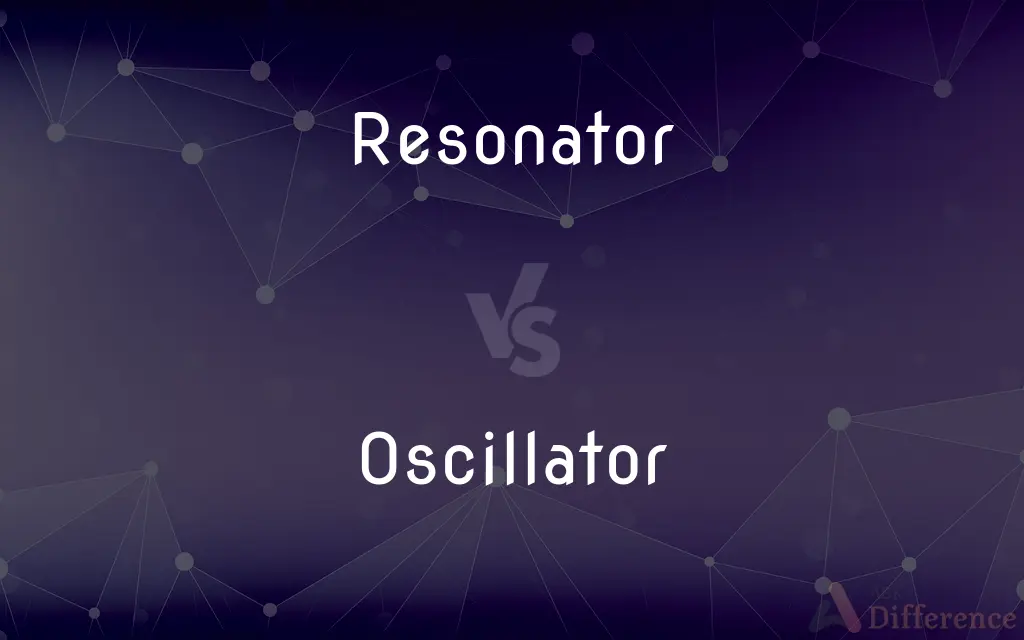Resonator vs. Oscillator — What's the Difference?
By Urooj Arif & Fiza Rafique — Updated on April 8, 2024
A resonator enhances certain frequencies, while an oscillator generates a repetitive signal.

Difference Between Resonator and Oscillator
Table of Contents
ADVERTISEMENT
Key Differences
Resonators are primarily used to select or amplify specific frequencies within a signal. They rely on physical properties like mass and elasticity in mechanical systems or capacitance and inductance in electrical systems. On the other hand, oscillators are designed to produce continuous, oscillating signals such as sine waves, square waves, or other complex waveforms. These devices are fundamental in generating clock signals for digital circuits, radio frequencies for communication devices, and signals in audio synthesizers.
While resonators can be passive, requiring an external signal to operate, oscillators are active components that require a power source to generate a signal. Resonators work by naturally vibrating at specific frequencies, enhancing or damping certain signals. Oscillators, however, use feedback mechanisms to produce a steady, repeating waveform.
Resonators are often used within oscillators to define or stabilize the frequency of the output signal. In this context, the resonator acts as a frequency-selective element, ensuring that the oscillator produces a signal at the desired frequency. Conversely, an oscillator without a resonator may produce a signal whose frequency is more susceptible to drift or variation due to changes in temperature, power supply, or other environmental factors.
The quality factor (Q factor) is crucial for resonators, indicating how selectively a resonator can filter or amplify frequencies. The higher the Q factor, the more selective the resonator. In contrast, the stability and purity of the waveform are more critical for oscillators, affecting how consistently they can produce the desired waveform over time and under varying conditions.
Resonators find applications in filters, sensors, and musical instruments, where specific frequencies are either enhanced or isolated. Oscillators, on the other hand, are ubiquitous in electronic devices, from clocks and watches to computers and mobile phones, where they provide a stable timing signal or generate an electrical waveform.
ADVERTISEMENT
Comparison Chart
Function
Enhances or selects specific frequencies
Generates a repetitive waveform
Requirement
External signal (for passive resonators)
Power source
Role in Electronics
Used within oscillators or as filters
Generates signals for clocks, communications
Key Parameter
Quality factor (Q factor)
Frequency stability, waveform purity
Applications
Filters, musical instruments, sensors
Clocks, synthesizers, communication devices
Compare with Definitions
Resonator
A device that resonates at a specific frequency.
A guitar string acts as a resonator, vibrating to produce sound at particular frequencies.
Oscillator
A mechanism in scientific instruments for measurement and testing.
The laboratory oscillator generates precise frequencies for experiments.
Resonator
A mechanical system that vibrates at resonance frequencies.
The tuning fork is a simple mechanical resonator.
Oscillator
An element in synthesizers for creating audio waveforms.
The oscillator in a synthesizer can produce a variety of sound waves, like sine and square waves.
Resonator
An element in electrical circuits for selecting frequencies.
The radio receiver uses a resonator to isolate the signal of a specific station.
Oscillator
A tool for generating radio frequency signals.
The oscillator in a transmitter generates the carrier wave for broadcasting.
Resonator
A component used to enhance the quality of sound in musical instruments.
The body of a violin serves as a resonator, enriching the sound produced by the strings.
Oscillator
A device used to produce oscillations in a mechanical system.
The quartz crystal in a watch is an oscillator that keeps time.
Resonator
A cavity or material in lasers for amplifying light by resonance.
The laser resonator amplifies light to produce a coherent beam.
Oscillator
A circuit that generates a repetitive waveform.
An electronic oscillator provides the clock signal for a computer.
Resonator
A resonator is a device or system that exhibits resonance or resonant behavior. That is, it naturally oscillates with greater amplitude at some frequencies, called resonant frequencies, than at other frequencies.
Oscillator
To swing back and forth with a steady, uninterrupted rhythm.
Resonator
A resonating system.
Oscillator
To waver, as between conflicting opinions or courses of action; vacillate
"The court has oscillated over the decades from more liberal to less, more conservative to less, depending upon who was president at the time of vacancies" (Gordon J. Humphrey).
Resonator
A hollow chamber or cavity with dimensions chosen to permit internal resonant oscillation of electromagnetic or acoustical waves of specific frequencies.
Oscillator
(Physics) To vary between alternate extremes, usually within a definable period of time.
Resonator
A resonant circuit.
Oscillator
A tuned electronic circuit used to generate a continuous output waveform.
Resonator
Any object or system that resonates
Oscillator
An instrument for measuring rigidity by the torsional oscillations of a weighted wire.
Resonator
A hollow cavity whose dimensions are selected so as to resonate at a specific frequency
Oscillator
(cellular automata) A pattern that returns to its original state, in the same orientation and position, after a finite number of generations.
Resonator
A resonant electronic circuit
Oscillator
One that oscillates
Resonator
A type of musical instrument, especially a guitar, that uses spun metal resonator cones to enhance the sound.
Oscillator
An instrument for measuring rigidity by the torsional oscillations of a weighted wire.
Resonator
Anything which resounds; specifically, a vessel in the form of a cylinder open at one end, or a hollow ball of brass with two apertures, so contrived as to greatly intensify a musical tone by its resonance. It is used for the study and analysis of complex sounds.
Oscillator
Generator that produces sonic oscillations or alternating current
Resonator
Anything that resounds or resonates;
Resonator
A hollow chamber whose dimensions allow the resonant oscillation of electromagnetic or acoustic waves
Resonator
An electrical circuit that combines capacitance and inductance in such a way that a periodic electric oscillation will reach maximum amplitude
Resonator
Any system that resonates
Common Curiosities
What is a resonator?
A resonator is a device that resonates or vibrates at specific frequencies, often used to select or amplify those frequencies.
How does an oscillator work?
An oscillator works by using a power source and feedback mechanisms to create a stable, repeating waveform.
What is the key difference between a resonator and an oscillator?
The key difference is that a resonator enhances specific frequencies from an external signal, while an oscillator actively generates a repetitive signal.
Why are oscillators important in electronics?
Oscillators are crucial for generating clock signals, radio frequencies, and audio signals in various electronic devices.
What determines the selectivity of a resonator?
The selectivity of a resonator is determined by its quality factor or Q factor.
Can a resonator generate signals on its own?
No, a resonator cannot generate signals on its own; it requires an external signal to resonate.
What is the role of a resonator in an oscillator?
In an oscillator, a resonator helps stabilize or define the frequency of the output signal.
Can oscillators operate without resonators?
Yes, oscillators can operate without resonators, but their frequency stability may be compromised.
How do resonators and oscillators contribute to music production?
Resonators enhance sound quality in instruments, while oscillators generate electronic waveforms in synthesizers.
Are all oscillators electronic?
No, oscillators can also be mechanical, as in the case of a pendulum, but electronic oscillators are more common in modern technology.
Can resonators be used for filtering signals?
Yes, resonators can be used as filters to isolate or remove certain frequencies from a signal.
How does the quality factor of a resonator affect its performance?
A higher quality factor means the resonator is more selective in amplifying or damping specific frequencies.
How does temperature affect oscillators and resonators?
Temperature changes can affect the frequency stability of oscillators and the resonance frequencies of resonators, necessitating design considerations to minimize these effects.
What types of waveforms can an oscillator produce?
Oscillators can produce various waveforms, including sine, square, triangle, and sawtooth waves.
Do resonators have applications outside of electronics?
Yes, resonators are used in acoustics, such as in musical instruments and architectural acoustics, to enhance sound quality.
Share Your Discovery

Previous Comparison
Alacrity vs. Celerity
Next Comparison
Craw vs. RawAuthor Spotlight
Written by
Urooj ArifUrooj is a skilled content writer at Ask Difference, known for her exceptional ability to simplify complex topics into engaging and informative content. With a passion for research and a flair for clear, concise writing, she consistently delivers articles that resonate with our diverse audience.
Co-written by
Fiza RafiqueFiza Rafique is a skilled content writer at AskDifference.com, where she meticulously refines and enhances written pieces. Drawing from her vast editorial expertise, Fiza ensures clarity, accuracy, and precision in every article. Passionate about language, she continually seeks to elevate the quality of content for readers worldwide.














































